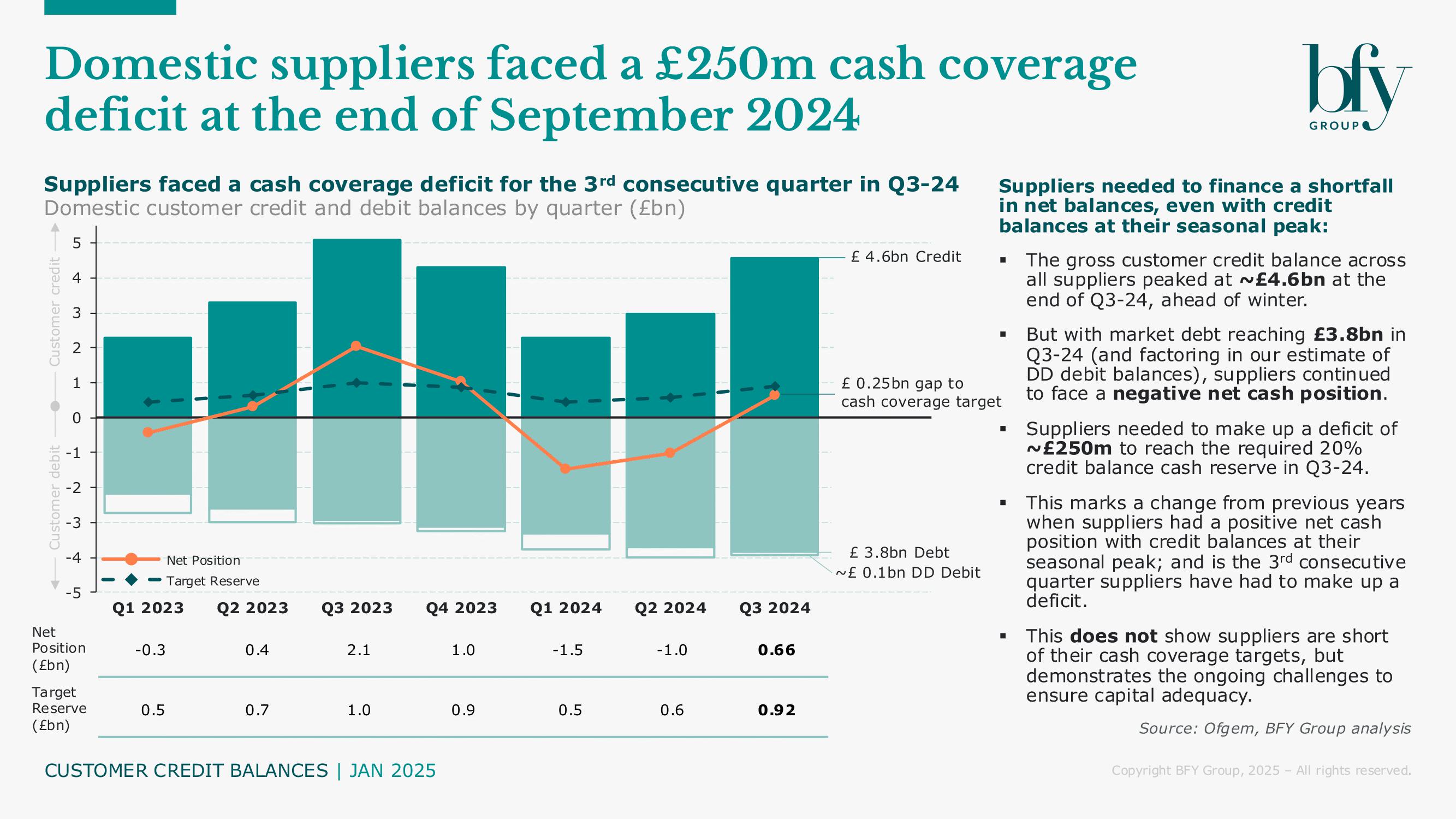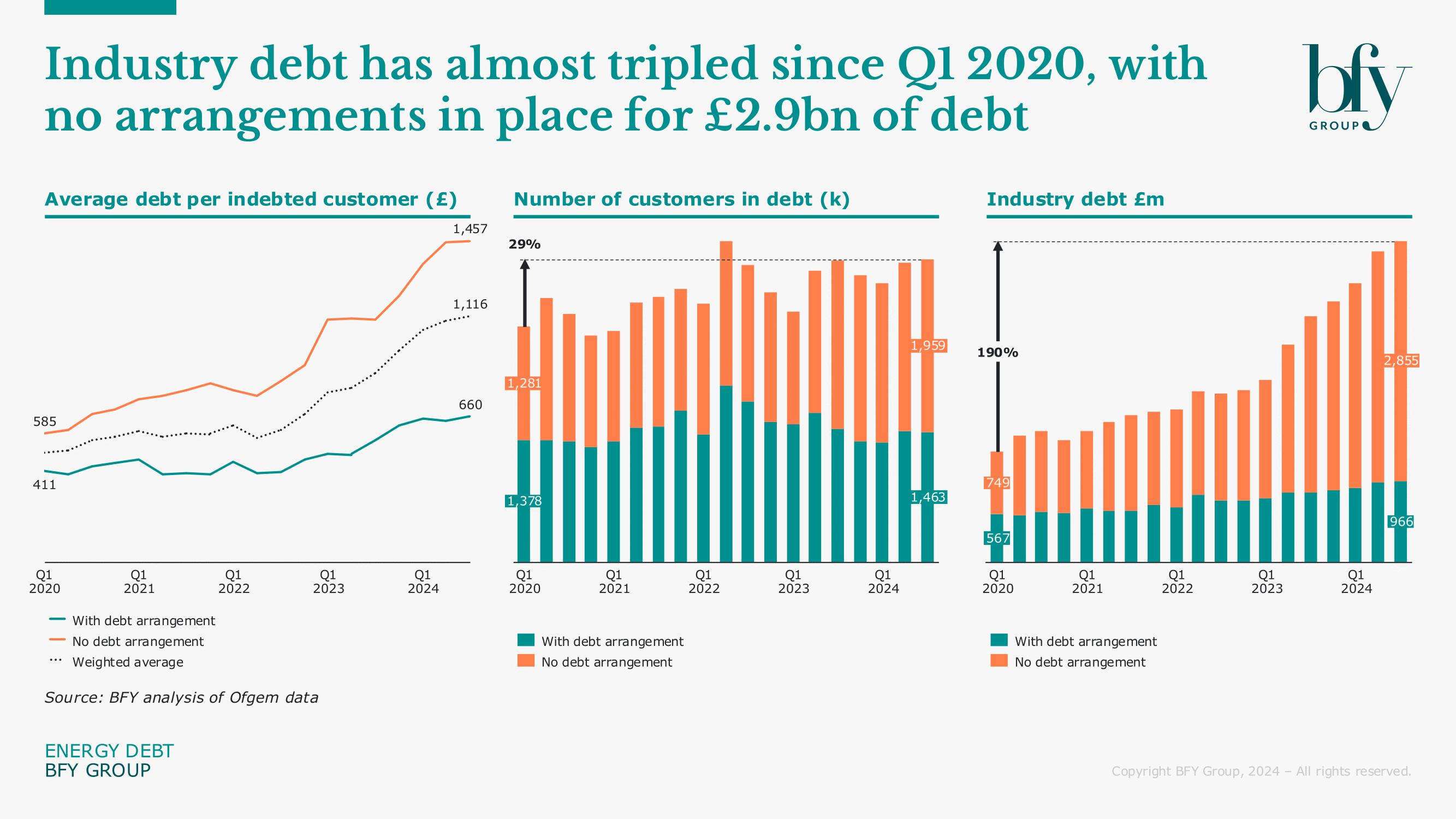Domestic energy suppliers faced a £250m cash coverage deficit at end of Q3. For the third consecutive quarter, suppliers had to finance a shortfall in net balances, even as customer credit balances reached their seasonal peak.
It marks a shift from previous years, when suppliers had a positive net cash position during this period.

Suppliers needed to finance a shortfall in net balances, even with credit balances at their seasonal peak:
- The gross customer credit balance across all suppliers peaked at ~£4.6bn at the end of Q3-24, ahead of winter
- But with market debt reaching £3.8bn in Q3-24 (and factoring in our estimate of DD debit balances), suppliers continued to face a negative net cash position
- Suppliers needed to make up a deficit of ~£250m to reach the required 20% credit balance cash reserve in Q3-24
- This marks a change from previous years when suppliers had a positive net cash position with credit balances at their seasonal peak; and is the 3rd consecutive quarter suppliers have had to make up a deficit
- This does not show suppliers are short of their cash coverage targets, but demonstrates the ongoing challenges to ensure capital adequacy
Energy debt hit a record £3.8bn in Q3-24, as Ofgem propose initiatives to raise standards
Energy debt reached a new high of £3.8bn in Q3-24, up £134m from the previous quarter, and £0.9bn over the past year.
Alarmingly, £2.9bn (75%) of this debt remains without any repayment arrangement in place, with 2m customers in this bracket. Total debt has almost tripled since 2020, and the volume of customers without repayment arrangements is up 700k (55%) in the same period.
Ofgem’s proposed initiatives, including a debt relief scheme and a ‘Debt Guarantee’ to protect vulnerable customers, offer potential long-term solutions. However, the ongoing rise in debt points to a more persistent issue – affordability.
During the energy crisis, interventions helped keep costs down for many customers, but in their absence, bills have plateaued at relatively high levels. As a result, clearing the existing debt backlog could have limited impact unless broader affordability challenges are addressed.
A fundamental rethink on affordability is likely needed to tackle the root causes. This could involve expanding targeted support programmes, such as the Warm Home Discount, or introducing stricter price regulation for vulnerable customers, through social tariffs or tiered pricing. Greater investment in energy efficiency and renewables will also help customers reduce consumption, but as with all these potential solutions, significant collaboration, funding and policy alignment is required.
Read the full article here.

Our Impact: Cash recovery initiatives deliver ~£275m benefit for large Energy supplier
BFY’s debt team supported a large Energy supplier with recovering their cash position, achieving a total benefit of ~£275m through collaborative initiatives.
How did BFY help?
Our debt team helped the supplier to re-think their approach to cash collection, encouraging a focus on:
- Prioritisation of the unbilled backlog, supported by root cause analysis of challenge drivers
- Implementation of unbilled focus groups, to help resolve issues and drive a reduction in backlog volume
- Enhancing proactivity in the customer engagement strategy to help build customer relationships, whist reducing payment delays and rebill occurrence
- Implementation of engagement strategy effectiveness measures, creating performance transparency, whilst driving greater ownership and management of customer accounts
- Increasing the accuracy and consistency of cash performance reporting, leading to a step change in operational collaboration within the team and the wider business
What were the results?
Overall, these collaborative initiatives enabled a ~£275m improvement in the supplier’s cash position, with operational and leadership effectiveness maximised by enhanced performance reporting and an improved customer engagement strategy.
The supplier also reduced their aged unbilled value by ~£45m, through focus groups dedicated to addressing their backlog. This was achieved by leveraging data, identifying root causes, and shaping the appropriate account remedy for improved customer engagement.
Read the case study here.
If you're looking for opportunities to manage customer debt better this winter, contact Rachel Littlewood to see how we can help.
Rachel Littlewood
Director
Rachel leads our operational and financial turnaround engagements, helping to solve complex operational challenges while maximising commercial performance and customer outcomes.
View Profile

